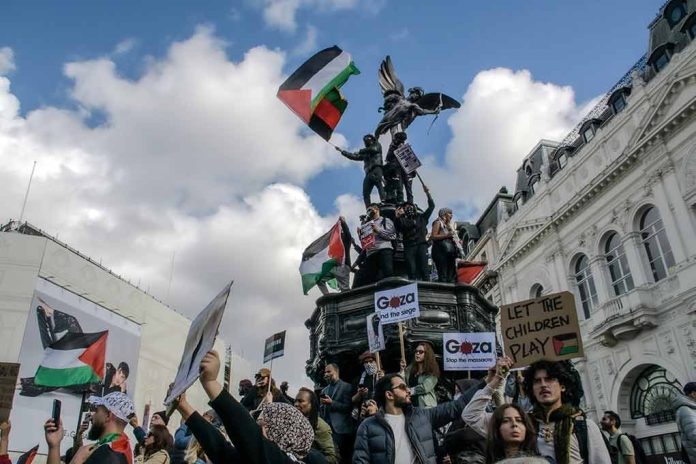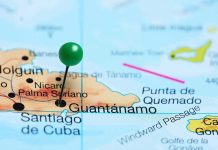
Palestinian President Mahmoud Abbas has made his strongest criticism of Hamas since the conflict began, calling them “sons of dogs” and demanding they disarm and release Israeli hostages to end the ongoing war in Gaza.
Key Takeaways
- Palestinian President Mahmoud Abbas publicly criticized Hamas, calling them “sons of dogs” and demanding they release hostages and give up control of Gaza.
- Abbas’s televised address represents his harshest criticism of Hamas since the war began 18 months ago, signaling a deepening rift within Palestinian leadership.
- Hamas has rejected recent ceasefire proposals that included disarmament, insisting on a full Israeli withdrawal from Gaza while maintaining their weapons.
- The ongoing conflict has resulted in over 51,300 Palestinian deaths according to Gaza’s health ministry, with severe humanitarian shortages across the territory.
- Abbas’s leadership of the Palestinian Authority has been criticized for ineffectiveness, with many Palestinians viewing him as increasingly irrelevant.
Abbas’s Unprecedented Public Rebuke
In a televised address that shocked many observers, Palestinian Authority President Mahmoud Abbas launched his most severe criticism of Hamas since the Gaza conflict began following the October 7, 2023 attack. Abbas directly accused the militant group of giving Israel “excuses” to continue its military campaign in Gaza. “Sons of dogs… release the hostages and be done with it,” Abbas said in his address, showing unusual intensity in his criticism of Hamas. The speech marks a significant escalation in the long-standing tensions between Abbas’s Fatah party, which governs parts of the West Bank, and Hamas, which has controlled Gaza since seizing power there in 2007.
Abbas’s comments reveal the deepening fractures within Palestinian leadership at a critical moment in the conflict. His call for Hamas to disarm and transform into a strictly political party represents an attempt to reassert the Palestinian Authority’s position as the legitimate governance structure for all Palestinian territories. This demand aligns with longstanding international expectations but has consistently been rejected by Hamas, which views its armed resistance as core to its identity and mission.
Palestinian president Mahmud Abbas called Hamas "son of bitches" and demanded them to release captives held in Gaza, calling it the main factor fuelling Israeli attacks on the territory, during a conference in Ramallah. pic.twitter.com/8WRy4WGkHe
— Middle East Eye (@MiddleEastEye) April 23, 2025
Hamas’s Defiant Response
Hamas officials quickly condemned Abbas’s language, with spokesman Bassem Naim expressing shock that the Palestinian president would “describe a significant and integral part of his own people using derogatory language.” The group has repeatedly rejected proposals that include disarmament, including a recent Israeli ceasefire offer that would have paused hostilities and released some hostages in exchange for Hamas giving up its weapons. Hamas maintains that it will not relinquish control of Gaza or surrender its arms without a full Israeli withdrawal from the territory.
This public feud underscores the profound challenge of establishing unified Palestinian governance – a key factor that has hindered peace negotiations for years. The Palestinian Authority has been unable to extend its control to Gaza since Hamas’s takeover, leaving Palestinians with two separate and often competing leadership structures. This division has complicated diplomatic efforts and weakened the Palestinian position in negotiations with Israel and the international community.
Humanitarian Crisis and International Response
The ongoing conflict has created a catastrophic humanitarian situation in Gaza. According to the Hamas-run health ministry, over 51,300 Palestinians have been killed since hostilities began, with at least 1,928 deaths occurring since Israel implemented a blockade on March 2. The United Nations has warned of severe food shortages and rising malnutrition, particularly affecting children. Recent Israeli airstrikes have targeted areas where displaced civilians are sheltering, including a strike on a school in Gaza City that reportedly killed 10 people.
Several Western governments, including the United Kingdom, France, and Germany, have called on Israel to end its blockade and allow humanitarian aid to flow freely into Gaza. However, Israel maintains that it is acting in accordance with international law and that sufficient aid was delivered during a recent temporary ceasefire. The Israeli military campaign was launched in response to Hamas’s cross-border attack on October 7, 2023, which resulted in approximately 1,200 Israeli deaths and the taking of 251 hostages, many of whom remain in captivity.
Abbas’s Waning Relevance
Mahmoud Abbas faces growing criticism from Palestinians who view him as increasingly irrelevant. Having remained in power without elections since 2005, his leadership of the Palestinian Authority has been characterized by corruption allegations and perceived ineffectiveness in advancing Palestinian interests. Many Palestinians have expressed frustration with Abbas’s inability to prevent Israeli settlement expansion in the West Bank or to achieve meaningful progress toward Palestinian statehood. His latest comments may further erode his standing among Palestinians who support Hamas’s resistance stance.









